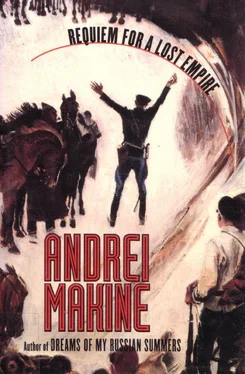It struck me that a further objection could be added to all of these: the wars started in order to test new weapons and those ended in order to lower the price of a barrel of crude oil. And a good many other negative aspects of things besides. But I let Vinner finish his performance, as one lets a guide complete the tour of a site of no interest. He did not have a coffee but some extremely frothy milk drink. And his concluding comments (he was speaking of the success of the "melting pot": "In the sun all cats are brown, isn't that so?") were accompanied by rhythmic gurgling and sucking noises. I reflected that the only counterargument in harmony with the genial tone of our meeting would have been to criticize the obesity of some of the vacationers around us. Vinner looked at his watch and hastened to bring matters to a close.
"I'll see what I can do. I can't make any promises. You know, we have plenty of doctors here and then some. But I have a friend who may be interested in your experience as a doctor in Chechnya. I should get a reply within-um-let's say four or five days."
That was the story I had quickly concocted with Shakh: an army doctor on the run from the Caucasus via Turkey, who had landed in America. Very sketchy, it had the advantage of corresponding to my former profession and being relevant to Vinner's. "Four or five days," that is to say not before the return of his colleague from China. I had an urge not to wait, to tell him who I was and why I had come. The obese woman next to us stood up and, as in a gag on television, almost walked away with the plastic armchair stuck to her backside. Vinner threw me a wink while noisily inhaling the rest of the froth from the bottom of his glass.
I needed words that would have eclipsed the sun, obliterated the whiteness of the sand, stilled the shouts and the peals of laughter. Words that would have been night, the dark, damp granite of cobbled streets, solitude. I realized that I had never left that night and that Vinner's seaside paradise was a future age into which I had strayed by mistake, and that in four or five days I would have to go back into my night.
"He forgot the sugar. I'll go and ask him for it."
I got up and went to the bar at the other end of the terrace. I had to wait for the barman to emerge from a cupboard where he was noisily stacking empty bottles. The ornamental pillar that extended upward from the counter to the ceiling was covered in small pieces of mirrored glass. One of the fragments gave a view of the table I had just left, as well as the one behind it, occupied by a young man reading a newspaper. Throughout our lunch I had been aware of the rustling of pages. Now, reflected in the mirror, I could see his face clearly. He had lowered the newspaper and was talking, without seeming to address anyone in particular. Vinner was turned slightly toward this mouth talking into thin air. A few seconds later he gave a little nod of his head. The man reading the newspaper picked up a bag placed under the table and left. His face, reflected on the pillar, jumped from one square of mirror to the next.
So Vinner was taking my appearance more seriously than all his chat about the new man and the melting pot on the beach might have suggested. I found my own reflection in one of the fragments. I had no idea if he could have recognized my face with these gold-rimmed spectacles and beard. I had no idea what those years now meant to him that lay between him and the dust and heat of that African capital on the verge of war where we had seen him for the first and last time. For him, certainly, it could only be a past he had suppressed, voluntarily wiped from his memory, relegated to the dull prehistory of his own life before his glorious present. Nor had I any idea in what manner the fact of having betrayed you was preserved, carried with him, tolerated in the brief moments of truth and solitude he could not avoid.
"Watch out for sunstroke," he warned as he left me. "And thieves. They can smell foreigners five miles off. Especially the young blacks and the Latinos, too. What a crew!"
"I see, I thought the melting pot…"
"Now, look, that's just between the two of us, as one Russian to another. Don't repeat what I said or you'll get yourself lynched."
That evening the taxi moved along slowly, often held up by cars trying to park near restaurants, and by the crowd of young vacationers embarking on their night of celebration. There was a fine, warm drizzle. The tanned skins of these very skimpily dressed young passersby shone with a dark gloss. Even more than on the beach one sensed their lust for life, their nonchalant insistence on happiness. As I had asked him to, the driver left Destin, following the coast. There was much too much traffic in those streets for it to be clear if I had been awarded an escort. I took a last glance through the rear window and asked for us to return the way we had come. I was aware that it was of no importance to understand what Vinner knew or did not know and how he might be preparing to respond to my appearance. I had neither to protect myself nor, above all, to imagine how my life might be after this trip to Destin. All that remained for me to live through was concentrated in the here and now.
The taxi dropped me in a quiet, narrow street, a street of small villas that already seemed fast asleep. One could hear the rain, heavier than a moment ago, and somewhere in the depths of the thick vegetation the voices from a television set, probably the dialogue from some science fiction film portraying a civilization in the twenty-fifth century All that remained of the sparkle at the town's center was a halo of faded brightness in the sky. As I walked along, the sound of conversations between men of future centuries gradually passed out of earshot and I could only hear the rain. I recognized Vinner's house from the wrought-iron ornaments on the gate.
The darkness was punctuated by bluish areas around the street lights. The alternation between this harsh glare and the dark foliage transformed my arrival there into a strange negative of my first visit, the day before, in the morning sun. Everything was repeated so precisely that it left me the leisure to observe brief gaps of absurdity and silence between words and actions.
The caretaker appeared, dressed in a windbreaker, looked at me through the gate and disappeared into the sentry box. The intercom hissed, I spelled out my name, then the name of the man who had recommended me. The caretaker's drawling questions came back at me, unchanged since the day before, as if in the rhyming refrains of a children's game. Vinner came out onto the front steps, a cluster of small lights flashed on, marking the curve of the path that led toward the gate. He came up, blinking in the drops of rain, and saw me. He smiled, rapidly erasing a slight twitch of annoyance or alarm that remained lurking in one of the lines of his forced grin. Before he could reach the gate a powerful but completely silent dog interposed itself and reared up at me, the whole of its long, muscular body seething with barely contained energy. Vinner invited me in, still smiling, like someone who has been disturbed just as he was nodding off for the night.
"Over here in the West you know, arriving like this at ten o'clock at night without warning is the best way to give your acquaintances a heart attack. Try doing it in Paris or London. Ringing the bell on the off chance and when the door opens announcing, as we used to do in Russia, 'It's like this, I was just passing in the street and I saw your light was on. So I decided to come up.' A cardiac arrest guaranteed! Well, that's a slight exaggeration. Come in, I've got some good whisky."
I realized that within a few more seconds this tone would again make it impossible to say what I had to say. Vinner s words had the same anesthetizing effect as his gurglings with a straw in the frothy milk of his glass, and the efforts of that obese vacationer standing up with the plastic armchair clamped to the rolls of flesh on her haunches.
Читать дальше










